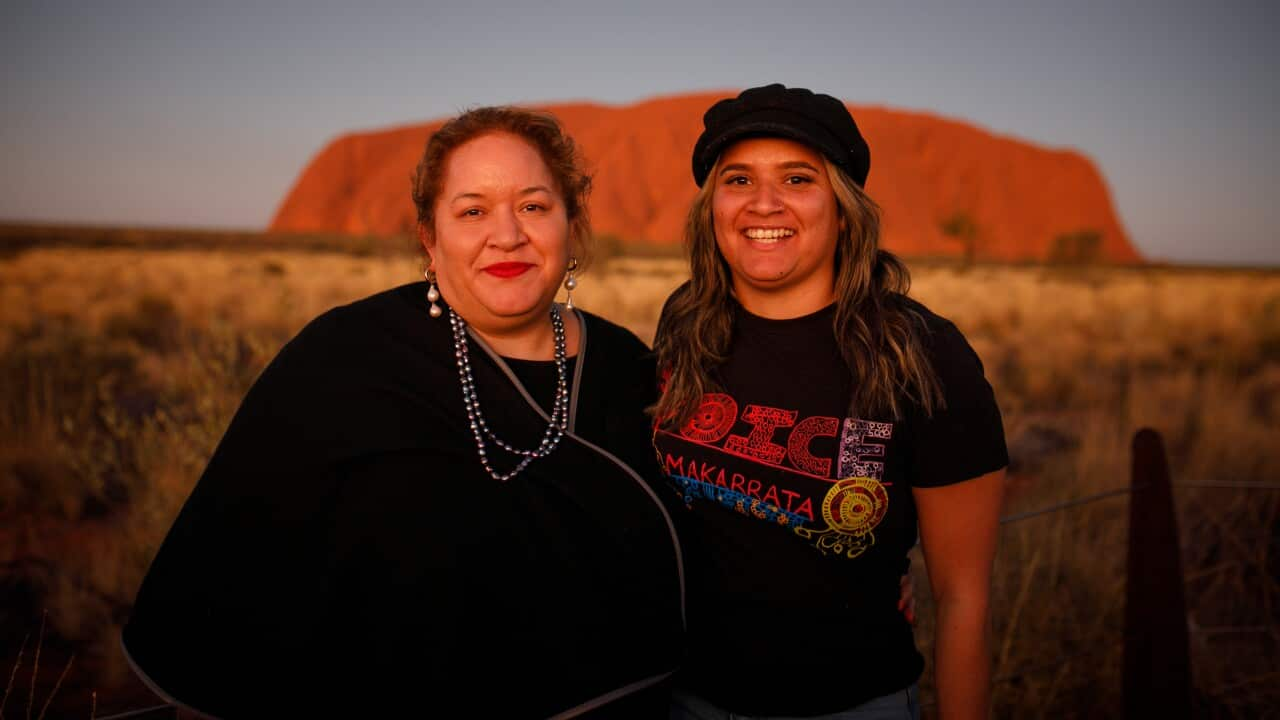For Uluru Dialogue spokespeople Allira Davis and Bridget Cama the eight years since the Statement from the Heart have been a "long ride".
The immediate sense of hope and optimism after the Statement was released at the Uluru Summit; the journey to help the wider community understand what First Nations people were asking for.
That gave way to the highs and lows of being intimately involved in the campaign for a First Nations Voice to Parliament; the disappointment of an unsuccessful referendum and then the determination to rebuild, stand up and keep working towards positive change.
"The Uluru Statement was a gift to Australian people to walk with us for a better future - and it's still intact," Allira told NITV.
"We're still working towards the reforms of the Uluru Statement from the Heart, especially the structural reform, to ensure our communities have a say on the matters that affect them.
"We are honoured and privileged to be a part of this journey, especially working with our leaders and the people that have come before us and really fight for change.
"So reflecting, there's a lot of emotion there, but there's still a lot to do and a lot to see, and as young people, we have to continue to keep that fire burning."
Uluru Dialogue co-chairs Professor Megan Davis and Pat Anderson said in a statement marking the May 26 anniversary that the Uluru Statement was a roadmap for a better future, grounded in truth, law, love and hope for this country.
"It was not, and never will be, a political proposal; it was a unifying invitation to walk with us for a better future, one we can all be proud of," their statement said.
"The Uluru Statement has reverberated far beyond that day at the Rock.
"It catalysed a national conversation and laid the foundation for an enduring movement.
"The Uluru Statement permanently shifted how this country understands the unfinished business of our constitutional relationship and recognition."
The Uluru Dialogue has led a public conversation about flaws of the Closing the Gap framework, saying there are issues with data and the structural design.
"It's a conversation that we need to continuously have – those conversations with community and asking them, 'What does the future look like? What does the future hold?'," Allira said.
"I think having the referendum was key in the in the sense of finding out what type of country we live in, and understanding where people stand with First Nations issues.
"It's very important that we, as the Traditional Owners and Custodians of land, still have that political participation and talk and have these conversations about what needs to change.
"Because something needs to change."
Prof Davis and Ms Anderson said progress towards Closing the Gap is failing because root causes are not being adequately addressed.
"The absence of structural recognition and the denial of our rightful place in the governance of our own affairs," they said.
"We cannot continue to reproduce models that exclude us and expect different outcomes.
"We have been let down by these models time and time again.
"To move forward positively, the Government must listen more broadly to our people in communities around this country and not solely to those who are contracted and paid by government."
Since the loss of the referendum on a First Nations Voice to Parliament in October 2023, Bridget believes the Albanese Government has shown too much timidity in Indigenous affairs but is hopeful the recent election will reignite discussion.
"What we need to see is this change towards governments talking with the right people, and that's people on the ground in our communities," she said.
"It needs to still be that bottom-up approach because, while the Coalition of Peaks and the community control sector are important, they don't necessarily represent the views of community.
"And so it's really important that we're moving towards true political participation through representative structures that represent our mob on the ground."
Bridget pointed out that the First Nations struggle for structural form, for recognition and for political participation stems back right to the early 1900s.
She said she hopes meaningful Constitutional recognition will be achieved in her lifetime.
"It's always going to be something that our nation has to deal with, and us having a say on the matters that affect us, and having that political participation and self determination in our own country," Bridget said.
"This is an Australian issue, something that our country has to deal with, both Indigenous and non-Indigenous.
"So we're really looking forward to what the next eight years might hold for us and, as young people, we're committed to this movement and working with Australians to drive this forward, because at the end of the day, it's going to be a people's movement."

